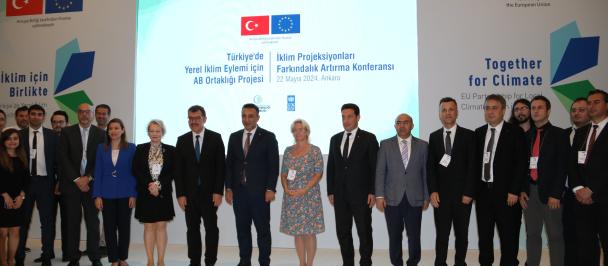Mayors of pilot provinces of UNDP’s initiative to enhance climate adaptation in Turkey discussed effects and solutions at the Climate Council
Local governments came together at a panel held on 24 February as part of Turkey’s first Climate Council and shared the effects of climate change on municipalities and their methods of combating the crisis. Metropolitan Municipalities of two of the pilot provinces of UNDP’s “Enhancing Adaptation Action in Turkey” initiative, Muğla and Samsun, and the Union of Municipalities of Turkey participated in the event.
The Climate Council was held on 21-25 February in Konya with the aim of establishing a roadmap in line with the Paris Agreement to reach net-zero emissions by 2053. Over 1,000 representatives of public institutions and universities, scientists, businesspeople, farmers, and activists attended the event. They convened to create a roadmap including fundamental policies and primary actions in the context of greenhouse gas reduction and climate change adaptation, which will set short, medium and long-term strategic goals. They aimed to contribute to the legislation to be drafted on climate with the active participation of all stakeholders in line with Turkey’s 2053 net-zero emission and green development targets.
At the Council, participants met to discuss all aspects of climate change which deeply affects Turkey and the world, establish special working groups, contribute to set the medium and long-term strategic targets, share opinions and suggestions and finally draft the recommendations. Since the consequences of the climate crisis will be different in every area, local efforts need to facilitate action tailored for these specific consequences. Local governments are the ones dealing with all risks, and they are responsible for finding local solutions.
Mayors of two of the pilot provinces of UNDP’s “Enhancing Adaptation Action in Turkey Project”, Mustafa Demir, Mayor of Samsun Metropolitan Municipality and Osman Gürün, Mayor of Muğla Metropolitan Municipality, and Birol Ekici, Secretary General of the Union of Municipalities of Turkey participated in the local governments panel at the Council to discuss the need for data in the fight against climate change, cooperation with stakeholders, capacity building, financing and action plans.
Mentioning the importance of working and preparing plans by considering the effects of climate change, Mustafa Demir said “We should not forget that the costs decrease when the investments are made by considering these effects. We must take advantage of climate friendly investments.”
Osman Gürün said “We have a net-zero target for 2053 and we must start working now to keep this promise. As Muğla, we should use the energy resources that we have while we are getting out of coal. We need to invest more in solar and wind energy. This is our power.”
Referring to the 1992 Rio Conference, Birol Ekici said that if we are to protect the world and the environment, we must act locally. “We continue with the motto of ‘Think Globally, Act Locally’. We need to strengthen local governments as we understand more and more their importance in the fight against climate change.”
It is important to understand the risks arising from climate change, to be prepared for these risks, to adapt to them, and to take advantage of the opportunities that may come up. UNDP’s initiatives aim to play a critical role in both engaging local stakeholders and creating a multi-sectoral dialogue at the national and local levels. UNDP supports climate adaptation actions in Turkey with Enhancing Adaptation Action in Turkey Project co-funded by the European Union and the Republic of Turkey and implemented in cooperation with the Ministry of Environment, Urbanization and Climate Change.
As part of this initiative, UNDP prepares local climate change adaptation strategies and action plans for 4 pilot municipalities of Konya, Muğla, Sakarya, and Samsun. Adaptation actions are prepared by measuring the effects of climate change in the city and making vulnerability analyses at the sectoral level. The adaptation action plans are prepared according to the impacts in 10 different sectors, which are agriculture and fisheries/livestock, ecosystems and biodiversity, water management, disaster risk reduction, urban, social development, industry, energy, tourism, cultural heritage, and public health.

 Locations
Locations




